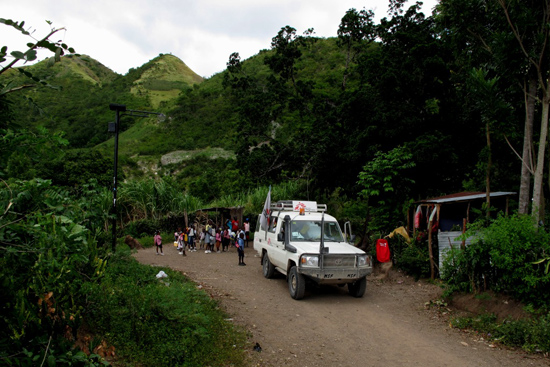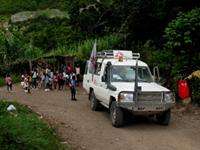
Haiti 2010 © François Servranckx/MSF
MSF teams provide cholera treatment supplies in Riviere Blanche, a remote area in northern Haiti.
Amid stepped-up efforts to stabilize Haiti’s confirmed cholera epidemic, Doctors Without Borders/Médecins Sans Frontières (MSF) continues to provide assistance to populations in remote areas of the country.
“I was admitted to the hospital because of diarrhea and vomiting," explains Joséphine, a woman in her fifties, as she tries to sit up in her bed in the hospital of Gros Morne, not far from the city of Gonaïves. “When I first arrived, I could not talk or stay upright. Now, I feel better.”
In this Ministry of Health facility—a nondescript building with a shaded courtyard—MSF teams provide support and expertise in terms of medical care, sanitation, and hygiene. This collaboration has proved effective. Managing a cholera response is a new experience for the hospital staff, and for the patients as well. “I’m afraid that my seven children will catch the disease, and I can no longer tend to my fields,” Joséphine says while speaking to another sick woman in the adjacent bed.
Many people in Haiti lack the means to reach medical facilities, which limits access to care. Both Joséphine and the women in the next bed are from a neighborhood known as Château. Members of this community have to walk for several hours to reach the hospital. Some residents cannot afford to pay for transportation even in the event of an emergency. Joséphine could, fortunately. “I had to pay the taxi moto 150 gourdes ($4) to get here,” she says, but "it took other patients a half-day to be transported here, lying on their bed.”
In the districts adjacent to the Gros Morne Hospital, MSF is providing sanitation assistance to health facilities. To bolster health clinics elsewhere in outlying areas in the north and center of the country, MSF is supplying IV solution, oral rehydration salts, IV sets, and hygiene materials. Supplies have also been provided to the hospital in the northern town of Port de Paix, and MSF is preparing cholera treatment centers in Gonaïves and Bassin Bleu.




